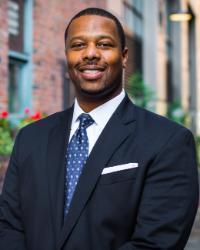Jamal Whitehead '07 brings the social justice values of Seattle U Law from the classroom to the courtroom.
This story originally appeared in Lawyer, Fall 2023.
When being considered for a job, few can say that one of their strongest champions is the president of the United States.
But that is exactly the case for Jamal Whitehead ’07, who became a United States District judge for the Western District of Washington this past spring after being nominated by President Joe Biden and confirmed by the U.S. Senate.

While Whitehead had practiced as an attorney in a variety of roles in both the private and public sectors since graduating from Seattle University School of Law, several themes remained the same in his work — namely, serving others in need.
During his four years as an attorney with the U.S. Equal Employment Opportunity Commission, Whitehead advocated on behalf of the government for workers who had faced employment discrimination. When he later returned to private practice, Whitehead continued to be a voice for workers’ rights.
In 2017, the firm at which Whitehead worked, Schroeter Goldmark & Bender, partnered with the Washington State Attorney General’s Office to sue The GEO Group, Inc., the company that runs the Northwest Detention Center in Tacoma for U.S. Immigration and Customs Enforcement. The lawsuit demanded that The GEO Group pay detained persons who work at the detention center the minimum wage instead of $1 per day for their labor. A jury ruled a $17.3 million verdict in favor of the workers in 2021, but The GEO Group is currently appealing it.
“To be able to stand up for the rights of people against powerful interests is really what I went to law school to do,” Whitehead said.
Seattle U Law, with its social justice mission, only strengthened that goal.
“Going to Seattle U gives you the benefit of perspective. There’s a large world out there, and I wanted to be someone who would help bend the moral arc of the universe toward justice,” Whitehead said. “I wanted to be able to say I was doing something at the end of the day that advanced the greater good.”
Whitehead remembers that early in law school, Professor Natasha Martin gave him an assignment to write his personal code of ethics. At the time, Whitehead found it “a little bit corny,” but it has helped him in the courtroom on many occasions — for example, when interacting with the opposing counsel.
“You encounter these issues where the right thing to do under the Rules of Professional Conduct is obvious, but there’s so much in between the rules that shapes and decides what sort of lawyer you want to be, what is my personal makeup,” he said. “So, I really appreciated that assignment — reflecting on it over the years has been very helpful.”
Martin said she was inspired but not surprised that Whitehead recalled that particular assignment.
“I remember Jamal as focused, engaged, and curious, often lingering after class to ask more questions or go deeper,” she said. “I couldn’t be prouder of Jamal’s ascension to the judiciary and am so excited for what this next phase brings for Judge Whitehead with his ‘Code of Ethics’ intact.”
Another Seattle U Law mentor was the very person whose seat on the bench Whitehead is now filling — Judge Richard Jones, who has become a senior district judge for the Western District of Washington.
"Judge Whitehead brings to the bench his incredible intellect and keen ability to work with people of varied backgrounds,” Jones said. “If you believe his star shines now, you will be in for an amazing journey as he puts forth his boundless energy and brilliance in becoming one of the greatest judges to serve our community.”
Whitehead met Jones, one of the first Black federal judges in Washington, through the Seattle U Law Black Law Student Association.
“Diversity on the bench is important. As the public face of justice, you should represent and reflect the communities,” Whitehead said. “There’s a legitimacy that comes from a litigant or a party being able to come in and believe, ‘This person will see me for who I am and can understand and appreciate some of the experiences in my life.’”
And in his judge’s robe, Whitehead incorporates the social justice values instilled in him at Seattle University.
“A good judge is someone who doesn’t engage in any pre-judgement of parties or issues, and who rules based on the facts and law that are before the court,” Whitehead said. “I want to make sure that all parties feel seen and are seen by the court, and that there’s trust – that regardless of who you are, person or entity, that you’re getting a fair shake in court.”
